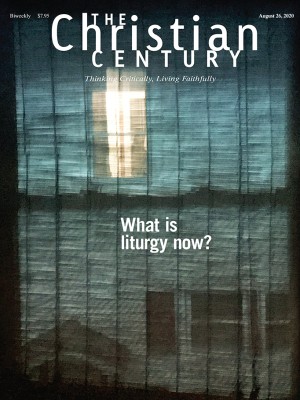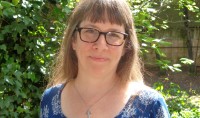Separated from one another—yet still in harmony
Evagrius Pontus and Howard Thurman knew God as simultaneously far and near.

A few weeks ago a beloved member of my congregation, Ildiko Szabo, died unexpectedly on a Sunday evening. Ildiko organized Bible studies, flipped pancakes for students on Mardi Gras, welcomed visitors and regulars with the same enthusiasm, and seemed always to be searching for ways to fill in the spaces between those around her with love and attention. She was one of the people whose face I always sought from the pulpit, and when I began taping my sermons for broadcast on the radio, she was one of the faces I imagined as I preached into my computer or my phone.
When we stopped worshiping together in the sanctuary in March, Ildiko began writing to me every Sunday, sometimes before the service began and sometimes just after it ended. Often she would attach photos from the arboretum where she loved to walk—insisting, always, on the beauty of the world. After she died, I scrolled through her emails, listening for her voice.
Read our latest issue or browse back issues.
What struck me was how Ildiko’s imagination had functioned for her during lockdown like a spiritual sense. On March 29, she wrote to say that it moved her to think of the ministers and musicians in our separate homes preaching and praying and making music to be knit into a service and broadcast on the radio. As she listened, she wrote, “I searched for your faces in this virtual environment.” I wish I’d been more attentive to the fact that this had been one of the invisible threads connecting us during our separation—the creative work of conjuring each other up, each of us seeking the other’s face.
On May 24, her note was a three-sentence short story about our return to the sanctuary one day. “We smile as our eyes meet,” the story ended, “and wonder how we reached these strange circumstances.” Ildiko’s micro-fiction, written in the present tense, was a form of hoping, and it made me feel hopeful, too.
On Easter morning, she wrote before the service began to say that, even alone in her home, she felt a sense of love, energy, and community drawing us all together. “This housebound experience,” she wrote, “has sharpened senses within me that I never felt.” Ildiko seemed determined to find, in the strangeness and sorrow of this time, new ways of receiving the world: searching for invisible faces in her mind’s eye, composing stories in the present of a future still uncertain, crossing distances on the bridge of her imagination and in the process discovering in herself new senses whose capacities she explored with curiosity and joy.
“The monk is one who is separate from all and in harmony with all,” the desert monk Evagrius Ponticus wrote in the fourth century. The thing that always strikes me about this sentence is the word and. Evagrius doesn’t say, at least in the translation I have, that the monk is one who is separate from all but in harmony with all. He simply says and, as if being separate from others and yet in harmony with them is a human capacity well within our reach. Ildiko found a way to dwell in that and, remaining physically distant and spiritually close. Ten centuries after Evagrius, another theologian, Marguerite Porete, would use that kind of language to describe her experience of God: God is like a faraway love, she wrote—so close within and so far outside. Her name for God was FarNear.
Closer to our own day, theologian Howard Thurman both embodied and taught how to inhabit Evagrius’s and. Thurman had faith in the capacity of human beings to cultivate a spiritual atmosphere—a climate of compassion and attention—that one person could pass on to another. He had experienced the contagious spiritual atmosphere of his grandmother when he was a child. Enslaved in Florida before the Civil War, her dignity, faith, and profound understanding of herself as a child of God were catching, Thurman said—and he caught them gratefully.
He recognized a similar spiritual climate in the life of Jesus, an atmosphere cultivated in solitude and then carried into community as an offering for others, something they could catch and participate in. Jesus’ spiritual climate is what made people around Jesus feel that they had been forgiven, Thurman says—it was the thing that drew children to him and allowed those harassed by their demons to feel calmer in his presence.
Thurman saw this atmosphere arising from Jesus’ movement between solitude and community, a movement Thurman himself tried to follow. We need time alone, he wrote, to reset our nervous systems and learn to give unhurried attention to each other. But when he first became a minister, he struggled to find a connection between the inner life he experienced in solitude and the communal life he experienced with his congregation. As he moved back and forth between the two, however, “the door between their questing spirits and my own became a swinging door” through which the far and the near met in the presence of what Marguerite Porete would call FarNearness itself.
It’s a struggle to inhabit Evagrius’s and in these days—to be far and near at once. But as Ildiko discovered, there are more senses to be sharpened within us than we knew; as Howard Thurman’s ministry revealed, there are more doors within us to be opened. In this time of both sorrow and hope, I hope we keep discovering new possibilities within our humanity that help us imagine what the world and we could become.
A version of this article appears in the print edition under the title “Both far and near.”






